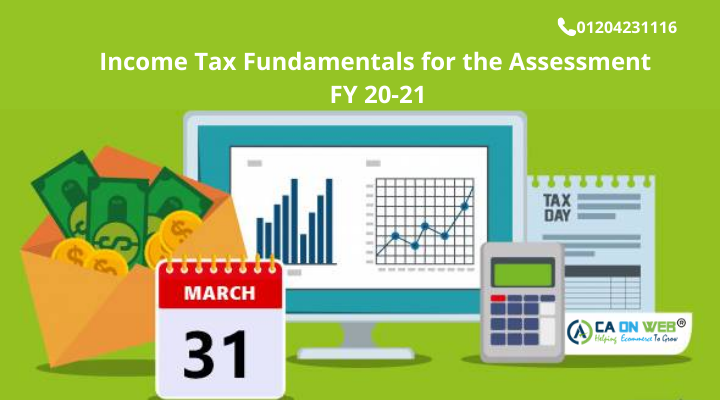What is income according to the Income Tax Act?
The term “income” has a very broad and inclusive meaning that is defined in Section 2(24) of the Income Tax Act; we will try to understand it broadly without going into too much detail.
Income from Salary: This is the amount you receive from your employer each month.
Rental income from the residential or commercial property: Any rental income from residential or commercial property that you own is subject to taxation. If you have a home loan, the interest portion is also considered negative income from real estate.
Income from a Business or Profession: Income earned from a business or profession is taxable under the heading “profits and gains of a business or profession.” The taxable income must be net of all expenses.
Income from capital gains: Any profit or gain arising from the transfer of a capital asset held as an investment (such as a house or jewellery) is taxable under the capital gains heading. Short-term and long-term gains can both contribute to the gain.
Other sources of income include: Any income that does not fall under one of the four income categories listed above is taxed under the income from other sources category. Savings bank interest, lottery winnings, etc. must pay 30% tax.
The first time a citizen pays income tax is a watershed moment in his or her life. Here is a list of income tax basics for beginners to help the first-timers to Understand that how the income is taxed (based on income source).
Financial Year
The financial year is the calendar year in which you earned your money. The financial year runs from April 1st to March 31st of the following year. The term “financial year” is sometimes abbreviated as “F.Y.”
Assessment Year
The assessment year (AY) comes after the fiscal year (FY). This is where the money received during the fiscal year or the fiscal year is assessed and taxed. Both the FY and the AY begin on April 1 and end on March 31.
Deductions under Chapter VI a
Allowed u/s 80C
Section 80C of the Income The Tax Act of India denotes various expenditures and investments that are exempt from income taxation. It allows an investor to deduct up to Rs.1.5 lakh from their total taxable income each year. Individual taxpayers and Hindu Undivided Families are the only ones who are covered by Section 80C. Corporate entities, partnership firms, and other types of businesses are not eligible for Section 80C tax breaks.
Some of the u/s 80C deductions are listed below:
Tax-saving Fixed Deposits: FDs are a good investment opportunity due to their structure. If you invest in a tax-saving FD scheme with a minimum lock-in term of five years, you can claim a tax deduction of up to Rs. 1.5 lakh under Section 80C.
Public Provident Fund (PPF): PPF account holders can invest up to 1.5 lakh in a fiscal year. PPF (Public Provident Fund) is a common investment scheme that provides a haven for money while also providing income tax benefits. PPF account holders may spend up to 1.5 lakh per fiscal year.
Sukanya Samriddhi Yojana: The Sukanya Samriddhi Yojana is a government of India small deposit scheme designed specifically for girls and launched as part of the Beti Bachao Beti Padhao campaign. The program is intended to cover the costs of a girl’s education and marriage.
Insurance policies: Investing in life insurance policies to protect the family’s security is also a tax-deductible contribution under Section 80C of the Income Tax Act of 1961.
Equity-oriented Mutual Funds: An equity-oriented combination fund invests at least 65 percent of its portfolio in shares. A debt-oriented hybrid fund, on the other hand, invests more than 65 percent of its assets in debt securities and the rest in equity.
Allowed u/s 80D
Section 80D of the tax code allows a person to deduct the cost of medical treatment for themselves, their partners, their dependent parents, and their dependent children. A deduction of Rs 25000 is available for premiums paid for parents under the age of 60, and a deduction of Rs 50,000 is available for parents over the age of 60.
Individuals (other than senior citizens) and HUF are permitted to deduct interest on savings account deposits under Section 80TTA. Section 80TTA allows for a Rs 10,000 deduction on interest income. This deduction is available to Resident Individuals and HUFs.
Allowed u/s 80GG
Section 80GG of the Income Tax Act of 1961 provides for a deduction, which is found in Chapter VI-A. It was enacted to provide relief to those who do not receive a house rent payment but must pay rent to remain in their home.
Allowed u/s 80E
Under Section 80E of the Income Tax Act, only the interest paid on your education loan during the fiscal year is deductible. The principal balance repayment would not result in a tax benefit. As a result, you will be able to deduct Rs. 48,000 from your gross loan EMI for the fiscal year.
TDS (Tax Deducted at Source) TDS is a percentage of one’s monthly income that is taxed for payment. According to the Revenue Enhancement Act of 1961, every individual or organization is required to pay taxes if their income exceeds a certain threshold.

Tax Deducted at Source must be deposited with the government by the 7th of the following month. TDS deducted in June must be paid to the government by July 7th.TDS deducted in March, on the other hand, will be deposited until April 30th.
Standard Deduction
A standard deduction is a one-time deduction made by people who are salaried or receive a pension.
Documents Required to File Income Tax Return in India When it comes to filing the ITR online, you would require a certain set of documents. These documents vary as per the source of income.
Below-mentioned is the detail regarding the same:
| Income Source | Required Documents |
| Income from Salary | Form 16, 16A, 26AS. Receipt of Rent for HRA. Payslips. The investment did under Section 80C, 80D, 80E, and 80G. |
| Rental income from the residential or commercial property | Certificate of home loan interest. Property address. Details of the co-owner, including capital share and PAN card details. |
| Income from capital gains | SIPs, ELSS, mutual fund statement, Debt fund, sale, and purchase of Equity Funds. Purchase/selling price, details of capital gains, and details of registration if any house property is sold. Statement of capital gains via selling shares and stock trading (if available) |
| Other sources of income include | Bank details, if receiving interest on Savings Account. Income received from an account in a post office. Details of interest received from tax-saving and/or corporate bonds |
FAQ
1. When should we file ITR?
The deadline for filing income tax returns is July 31 (after the end of each financial year in which you must file). This date may be extended by the income tax department.
2. What precautions should be taken while filing ITR?
The selection of the Return Form to be used should be filled in carefully. Typing Errors or Mistakes While Filing the Return Form should be taken care of. Interest from bank deposits or NSC certificates should be disclosed. Deduction for the investment made under 80C, 80CCC & 80CCD should be calculated accurately.
3. Can an income tax return be filed manually?
There are two ways to submit an ITR form online. One is to manually enter the details and submit the return online. The other is to upload the XML file in an offline way.
4. What happens if I don’t file ITR?
If you file your tax return after the deadline under Section 234F, a late filing fee will apply. Penalties can be up to Rs. If the assessor submits a return after the due date, he will be 10,000. If your income is below your tax limit, you do not have to pay if you file your tax return after the deadline.
5. Who is required to file an income tax return?
Anyone earning more than the basic exemption limit under the Income Tax Act, whether a person, a legal entity, or a group of people, is required to pay income tax.
If you are planning to file Income Tax Returns on time you have landed at the right place. Please visit: CAonWEB
POPULAR ARTICLES

Chartered Accountant by profession, CA Sakshi Agarwal has an experience of above11 years in Cross Border compliance , Import Export , International Taxation & is a passionate content creator.
